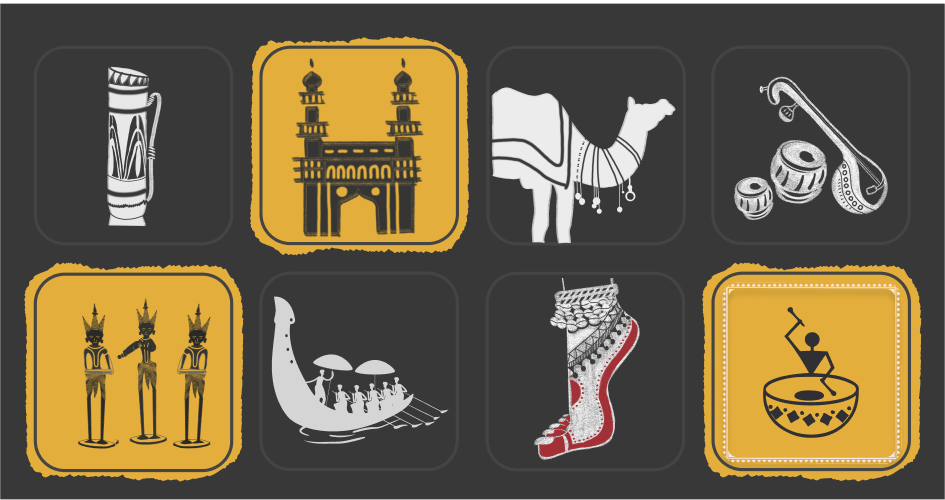Hampi: Echoes of an Empire and the Enigmatic Stone Chariot
Hampi: Echoes of an Empire and the Enigmatic Stone Chariot
Hampi, bathed in the golden glow of Karnataka, stands as a testament to the grandeur of the Vijayanagara Empire. This UNESCO World Heritage Site is an open-air museum, where ruins whisper tales of an excellent past. Towering gopurams pierce the azure sky, elaborate carvings inform memories of gods and heroes, and the Virupaksha Temple complicated hums with the chants of devotees. Amidst this tapestry of records lies a jewel that embodies the artistic zenith of the era—the Stone Chariot.
Once the wealthy capital of the Vijayanagara Empire, Hampi now stands as a testament to the grandeur of its bygone era. Sprawled throughout an expansive panorama of rocky terrain and plush greenery, this archaeological website boasts a wealthy tapestry of monuments, temples, and ruins that provide a glimpse into India's illustrious past.
A King's Vision Takes Form: Krishnadevaraya and the Inspiration for the Chariot
The story of the Stone Chariot is intricately connected to the illustrious Krishnadevaraya, the prestigious ruler of the Vijayanagara dynasty (1509-1529 AD). Not only a valiant warrior, he was also a visionary consumer of artwork and architecture. Legend has it that in his military marketing campaign in Kalinga, he encountered the awe-inspiring Sun Temple of Konark. Inspired by its grandeur, he predicted a similar chariot-formed shrine devoted to Garuda, the divine automobile of Lord Vishnu.
Visit Us and Experience Quality
At the coronary heart of Hampi's majestic landscape lies the Stone Chariot, a hanging monument symbolizing the city's wealthy background and creative excellence. Carved from a unmarried block of granite, this intricately sculpted chariot resembles a majestic horse-drawn carriage frozen in time. While historic facts do not explicitly point out the names of the architects and sculptors who delivered Krishnadevaraya's imaginative and prescient to lifestyles, their legacy is etched in each complicated element of the Stone Chariot.
Imagine yourself standing before it - carved from massive blocks of granite, it resembles a celestial chariot poised for a heavenly journey. The colossal wheels, meticulously sculpted to resemble blooming lotuses, with some even possessing the ability to rotate, add to the realism. The facade of the chariot is a symphony in stone, adorned with a kaleidoscope of carvings depicting mythological narratives from ancient epics. You see battle processions unfold, celestial beings like celestial musicians (Gandharvas) and heavenly dancers (Apsaras) come alive, and stories from the epics like the Ramayana and Mahabharata are etched for eternity. Each carving showcases the exceptional craftsmanship and artistic mastery of the Vijayanagara artisans. Their dedication to their craft is evident in the intricate details - the delicate expressions on the faces of the figures, the flowing folds of their garments, and the ornamentation that adorns the chariot's every surface.
Hampi stone chariot Eco Plastic 6" Pure Copper
Also called the Vittala Temple Chariot, the Stone Chariot is well-known for its intricate carvings and architectural brilliance. Built in the course of the reign of King Krishnadevaraya inside the sixteenth century, it served as a shrine committed to Lord Vishnu. Adorned with ornate sculptures depicting mythological stories and celestial beings, it stands as a testament to the craftsmanship and devotion of its creators.
Beyond the charm of the Stone Chariot, Hampi beckons traffic with its myriad temples, monuments, and ruins. The Virupaksha Temple, dedicated to Lord Shiva, stands tall as a living testomony to the city's spiritual fervor and architectural prowess. The grandeur of the Vijaya Vittala Temple, with its famed musical pillars and awe-inspiring architecture, further provides to the mystique of this historical town.
Explore our collections in idol, Figurines, Artefacts, Monuments
The identity of the builders of this marvel remains shrouded in the mists of time. We don't know their names, their life stories, or their motivations. Perhaps they were driven by devotion to their faith, a desire to serve the emperor's vision, or simply the love for their craft. But one thing is certain - they weren't mere artisans; they were storytellers. With every meticulous stroke of their chisel and hammer, they wove tales of faith, valor, and the empire's glorious reign into the very fabric of the monument. The Stone Chariot is a testament to their dedication and a window into the artistic sensibilities of the Vijayanagara era. Their legacy continues to inspire generations of artists, architects, and history enthusiasts. Even today, we stand in awe of their skill, marveling at the intricate details and the sheer scale of their creation.
For more details, please contact us


